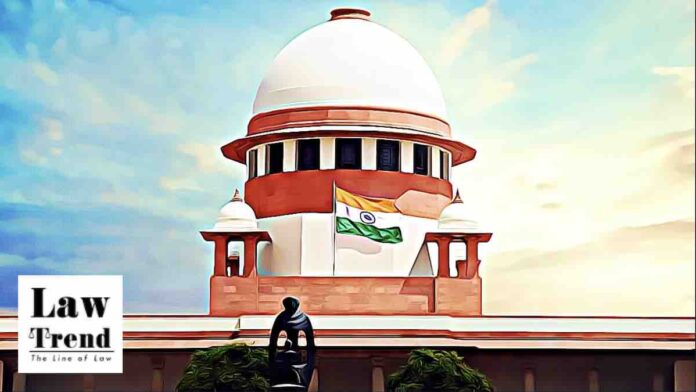A judge is “judged” everyday by lawyers, litigants and the public as courts are open forum, the Supreme Court said on Friday while holding that it cannot quash the recommendation or call upon its collegium to reconsider its decision on appointment of judges while exercising power of judicial review.
The apex court, which had on February 7 refused to entertain two petitions seeking to restrain Lekshmana Chandra Victoria Gowri from taking oath as an additional judge of the Madras High Court, on Friday gave the reasons for dismissing the pleas.
A bench of justices Sanjiv Khanna and B R Gavai noted that during the hearing, it was accepted that a number of persons, who have had political backgrounds, have been elevated as judges of high courts and the Supreme Court, and “this by itself, though a relevant consideration, has not been an absolute bar to appointment of otherwise a suitable person”.

The top court said similarly, there have been cases where people recommended for elevation have expressed reservations or even criticised policies or actions, but this has not been held to be a ground to treat them as unsuitable.
“It goes without saying that the conduct of the judge and her/his decisions must reflect and show independence, adherence to the democratic and constitutional values,” the bench said, noting that this is necessary as the judiciary holds the centre stage in protecting and strengthening democracy and upholding human rights and rule of law.
While referring to several previous judgements of the apex court, including two nine-judge bench verdicts, the bench noted, “it is opined that judicial review lies when there is lack of eligibility or ‘lack of effective consultation’. Judicial review does not lie on ‘content’ of consultation.”
“We are clearly of the opinion that this court, while exercising power of judicial review cannot issue a writ of certiorari quashing the recommendation, or mandamus calling upon the collegium of the Supreme Court to reconsider its decision, as this would be contrary to the ratio and dictum of the earlier decisions of this court referred to above, which are binding on us,” the bench said.
“To do so would violate the law as declared, as it would amount to evaluating and substituting the decision of the collegium, with individual or personal opinion on the suitability and merits of the person,” it said.
The apex court said on taking oath, a person pledges to work as a judge to uphold the Constitution and laws.
It said Article 51A of the Constitution casts an obligation on every citizen, and more so, on every judge to promote harmony, spirit of common brotherhood among all transcending religious, linguistic, regional or sectional diversities.
“Principle of secularism and dignity of every individual regardless of the religion, caste or creed, is the foundation of Rule of Law and equal protection of laws. Not only is the conduct and judgments delivered considered at the time of confirmation, a judge is judged everyday by the lawyers, litigants and the public, as the courts are open and the judges speak by giving reasons in writing for their decisions,” the bench said.
It noted the legal issue raised in the petitions, which had opposed Gowri’s appointment as an additional judge, relates to the scope and ambit of judicial review in the matter of appointment of judges to high courts under Article 217 of the Constitution.
“In our opinion, this legal issue is settled and is not res integra,” it said.
It noted that Article 217(1) prescribes the constitutional requirement of consultation and fitness of a person to be appointed as a judge of the high court is evaluated in the consultation process.
The bench further noted that evaluation of worth and merit of a person is a matter entirely different from eligibility of a candidate for elevation.
“Thus, this judgment draws on the basic difference between eligibility and suitability. Eligibility is an objective factor which is determined by applying the parameters or qualifications specified in Article 217(2). Therefore, when eligibility is put in question, the question would fall within the scope of judicial review,” it said.
“However, the question whether a person is fit to be appointed as a judge essentially involves the aspect of suitability and stands excluded from the purview of judicial review,” the bench said.
It also referred to another verdict of the apex court which had observed that consultative process envisaged under Article 217(1) is to limit the judicial review, restricting it to the specified area, that is, eligibility, and not suitability.
Elaborating on the procedure starting from the collegium of the high court making a recommendation for elevation, the bench said opinion and comments of the judges in the apex court conversant with the affairs of the high court concerned are also called for in writing and placed before the collegium.
“Invariably a number of shoot down and dismissive letters and communications from all quarters are received. Only thereafter, and on consideration, the collegium of the Supreme Court takes a final call, which is then communicated to the government,” the bench said.
“The petitioners have themselves stated and enclosed copy of their representation dated February 1, 2023, albeit the collegium of the high court and the Supreme Court have not, on this basis, deemed it appropriate to withdraw the recommendation or recall their decision,” it said, while dismissing the pleas at the admission stage.
Minutes before the top court had on February 7 dismissed the pleas against Gowri’s appointment, she was administered the oath of office as an additional judge by Madras High Court’s Acting Chief Justice T Raja.
The petitioners in one of the pleas had referred to alleged hate speeches made by Gowri against Muslims and Christians.







